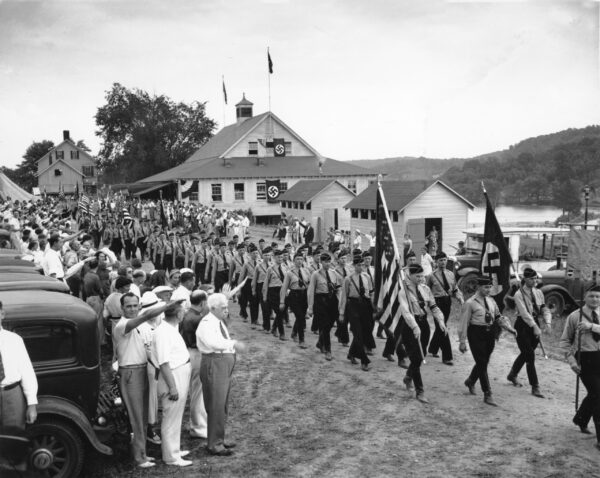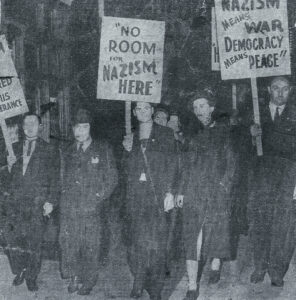
Earlier this year, I wrote an article titled “Archives in Defense of Truth” where I spoke of the importance of archivists making available documents that tell the true story. This message feels even more relevant as we face the current crisis in Israel and the even further increase it has triggered in the already deep anti-Israeli, antisemitic sentiment that we have seen in this country.
As always, I look at current events through a historic lens and, in this instance, I’m looking at the history of hate and fear of the “other” in America and why antisemitism has never really gone away.
America was built on the set of beliefs that all are created equal with fundamental rights. I think we can agree that these are, for the most part, abstract ideas that haven’t actually been put into practice.
Ironically, the United States is a nation of immigrants with a long history of xenophobia and regulations on immigration that began soon after independence was won. Since then, immigration laws have evolved to reflect the social and political leanings of the time.
By the late 19th and early 20th centuries, extremely restrictive laws were enacted when immigrants were primarily coming from Southern and Eastern Europe, many of them Jews. These restrictions were happening at the same time as the country saw the enactment of even harsher laws upon our own citizens, including Jim Crow Laws enforcing racial segregation, the Sedition Act of 1918 which limited free speech, and the Federal Housing Authority which would sponsor redlining blocking Blacks and other minorities from accessing home mortgages, as early as the 1930s.
All of these policies were designed to keep marginalized groups as second-class citizens.
Americans often think of Nazism as a foreign issue but forget that many of the ideas and conceptions for German laws were modelled after these policies in the United States. Jim Crow laws were among those the Nazi party studied to develop their own ideas of how to strip citizens of their legal and political rights. They wanted to know how one of the strongest countries in the world, with a democratically elected government, could somehow create a separate standard of laws for minorities. The Germans used the research to form the Nuremberg laws which stripped German Jews of their citizenship.
 In the 1940s politicians, business leaders, and known personalities were using their celebrity to push forward an agenda to propagandize Nazism to the American people. Why? They may have taken a pro-Nazi stance not to create an alliance with Germany but to keep the U.S. out of the war as they were adamantly opposed to Communism. Some of their beliefs aligned with the Nazi party such as being staunchly anti-Communist, they felt a threat that the immigrant would take jobs, they desired to be isolationists and they would see German’s military growth during the war as a strength.
In the 1940s politicians, business leaders, and known personalities were using their celebrity to push forward an agenda to propagandize Nazism to the American people. Why? They may have taken a pro-Nazi stance not to create an alliance with Germany but to keep the U.S. out of the war as they were adamantly opposed to Communism. Some of their beliefs aligned with the Nazi party such as being staunchly anti-Communist, they felt a threat that the immigrant would take jobs, they desired to be isolationists and they would see German’s military growth during the war as a strength.
So much of what we’re seeing now was happening then. Book bans… politicians using power to try to overthrow the government… pressure on the judicial system to prosecute or to stop prosecutions against citizens… even the suggestion of building a wall to keep out (then Jewish) refugees. In 1939, Senator Robert R. Reynolds of North Carolina introduced a bill that called for halting all immigration into the United States for 10 years. “Let’s save America for Americans,” he argued. “Our country, our citizens first.” In 1941, Reynolds would suggest building a wall around the United States that “no refugee could possibly scale or ascend.”
Many of these forces that existed then and that we’re seeing again now offer valuable lessons that we must always remember. Antisemitism continues and history urges us to be vigilant. Apathy, complacency, and silence only perpetuate hatred. In David Nirenberg’s Wall Street Journal article, “History Can Be an Antidote to Antisemitism,” he explains that this resurgence is often packaged as new revelations, but they are based on old beliefs and “by calling our attention to past examples of how ideas like antisemitism have influenced humanity, history can provide an antidote to prejudice.”
It is hard to escape institutional solutions when they historically have been part of the problem, so it is up to us to lean on each other and to remind people that these old, tired prejudices have always failed, and archives and history will always be the antidote to the viruses of hatred and misinformation.
Caption (top): Set in Andover, NJ, Camp Norland was the largest of more than 20 camps established by the German-American Bund. This photo from 1937 shows hundreds of uniformed Americans who pledged to make the United States “a white man’s Christian country again.”
Caption (above): Upon hearing that Fritz Kuhn (leader of the American German Bund) was to appear at Newark’s Bund meeting at Schwabenhalle, Nat Arno brought 50 demonstrators to the site to protest, 1939.

